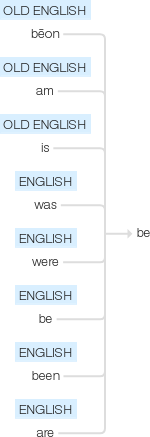Been
Old English bēon, an irregular and defective verb, whose full conjugation derives from several originally distinct verbs. The forms am and is are from an Indo-European root shared by Latin sum and est . The forms was and were are from an Indo-European root meaning ‘remain’. The forms be and been are from an Indo-European root shared by Latin fui ‘I was’, fio ‘I become’, and Greek phuein ‘bring forth, cause to grow’. The origin of are is uncertain.
wiktionary
From Middle English been(past participle), from Old English (ġe)bēon.
Either from Middle English been(“to be”, infinitive) (from Old English bēon), or from a dialectal use of the preceding past tense form as an infinitive form (compare dialectal use of (I)'s, (I) is in the first person, (he) am in the third person, etc).
From Middle English been(plural indicative form).
been
etymonline
been (v.)
past participle of be. Dismissive slang phrase been there, done that attested from 1994 (been there "had the experience," usually of something disreputable, is from 1880s).
